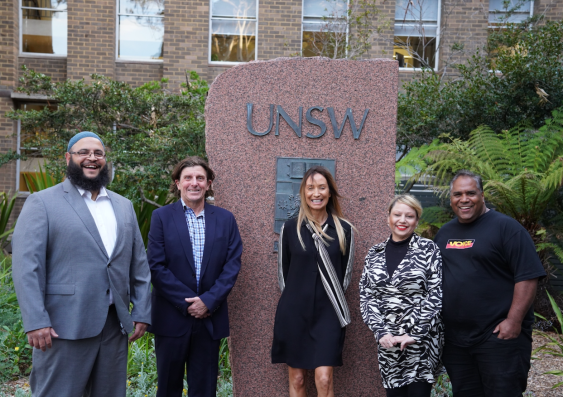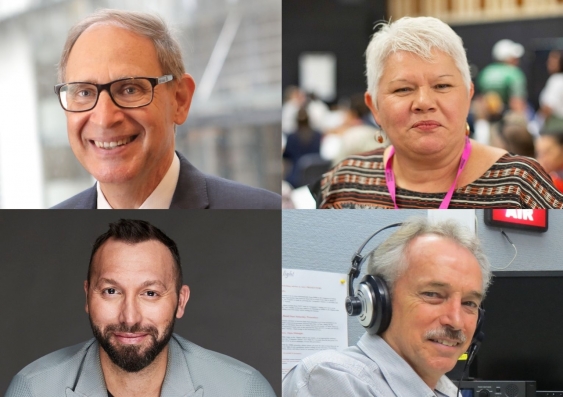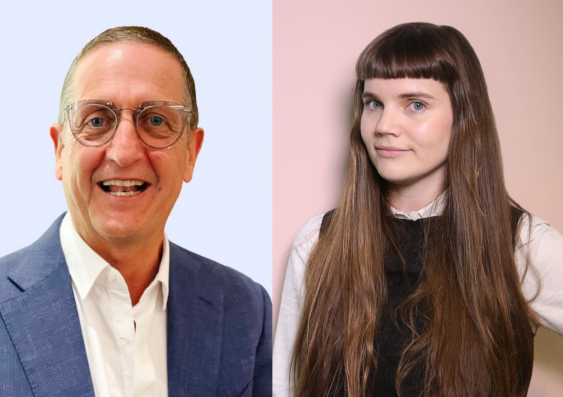2024 Australian Mental Health Prize winners announced
2024-09-24T08:00:00+10:00

The 2024 Australian Mental Health Prize winners, Dr. Marilyn Anderson, Professor Michael Berk, Dr. Louise Byrne and Professor Juli Coffin.
║┌┴¤═°┤¾╩┬╝à Sydney
Four Australians have been recognised, including a researcher whoÔÇÖs created an equine therapy program for Aboriginal youth and an academic whoÔÇÖs reshaped the treatment of psychiatric disorders globally.
The winners of the have been unveiled at ║┌┴¤═°┤¾╩┬╝à Sydney, celebrating individuals who have made significant strides in mental health research, advocacy and support.
Presented by the Hon. Emma McBride MP, Assistant Minister for Mental Health and Suicide Prevention and the Hon. Rose Jackson MLC Minister for Mental Health, the winners in each category are:
- Aboriginal or Torres Strait Islander - Professor Juli Coffin
- Lived Experience - Dr. Louise Byrne
- Professional - Professor Michael Berk
- Community Hero - Dr. Marilyn June Anderson
Professor Allan Fels, past winner and co-chair of the Australian Mental Health Prize Advisory Group said: ÔÇ£The dedication of this yearÔÇÖs winners highlights the power of personal experience, cultural security, and scientific innovation in mental health. Their work offers hope and tangible support to countless Australians. We are honoured to celebrate their achievements, inspiring us to prioritise mental wellbeing for everyone.ÔÇØ
║┌┴¤═°┤¾╩┬╝à Vice-Chancellor and President, Professor Attila Brungs, said: ÔÇ£These winners embody the spirit of innovation and commitment in mental health advocacy, research, and support. I congratulate them on driving meaningful change and inspiring a more inclusive and compassionate approach to mental wellbeing.ÔÇØ
Professor Juli Coffin - Aboriginal or Torres Strait Islander
Prof. Coffin is a leading Aboriginal researcher deeply connected to Nyangumarta country in the Pilbara in Western Australia. She is dedicated to improving the social and emotional well-being of Aboriginal youth.
She created the Yawardani Jan-ga Equine Assisted Learning program, based in the Kimberley region. The therapeutic initiative allows participants to interact with horses, and offers a culturally grounded alternative to conventional therapies. Yawardani Jan-ga - meaning "horses helping" in the Yawuru language - reflects Prof. CoffinÔÇÖs mission to incorporate cultural security into health and education systems.
Prof. Coffin, who is the Ellison Professor of Aboriginal Young PeoplesÔÇÖ Social and Emotional Wellbeing at Murdoch University, said her work shows how Aboriginal communities have the power to heal and thrive from within.
ÔÇ£Imagine not having control over any part of your lifeÔÇöthis is the reality for many of our youth. Our program gives participants the chance to reclaim their sense of agency and inner strength,ÔÇØ she said.
Prof. Coffin said there needs to be a shift away from the deficit-focused models that highlight what is broken, and instead invest in approaches that build on our strengths and knowledge.
ÔÇ£Real change takes time and must honour our identity and cultural practices. This is about healing on our terms,ÔÇØ she said.╠²
Dr. Louise Byrne -╠²Lived Experience
Dr. Byrne is a pioneering mental health advocate, and her groundbreaking 15-year research program has been instrumental in promoting the understanding and credibility of Lived Experience as a discipline. Her personal experiences with mental health and adversity have driven her to become a leader in the sector.
Dr. Byrne led the development of the National Lived Experience (Peer) Workforce Development Guidelines, a key action of the Fifth National Mental Health and Suicide Prevention Plan, which offers practical steps to integrate Lived Experience principles into mental health services nationwide. Through her roles at RMIT University, Yale University, and her strategic consulting and training, Dr. Byrne influences mental health systems in Australia and internationally.
ÔÇ£Lived Experience leaders bring practical knowledge essential for creating effective, compassionate services. By drawing on our unique insights and expertise, we can address deep-rooted challenges like marginalisation and loss of identity, leading to more inclusive systems,ÔÇØ Dr Byrne said.
ÔÇ£For genuine reform, it's crucial to share power at every stage ÔÇô from setting priorities to implementing and evaluating services.ÔÇØ
Professor Michael Berk -╠²Professional
Prof. Berk is a distinguished mental health researcher whose work has transformed the treatment of psychiatric disorders both in Australia and globally. As Director of the Institute for Mental and Physical Health and Clinical Translation (IMPACT) at Deakin University, his early research led to the first randomised controlled trials showing the effectiveness of medications for bipolar disorder ÔÇô which are now standard treatments worldwide.
Prof. Berk advocates for more research into bipolar disorder, a treatable but under-researched condition with great potential for breakthroughs. One of his teamÔÇÖs most innovative contributions is using stem cell technology for drug discovery and repurposing. By developing a platform with patient-derived stem cells, his team can identify existing medications to treat psychiatric disorders, speeding up the development of new treatments.
The key to advancing mental health care lies in bridging the gap between innovative research and practical applications, Prof. Berk said.
ÔÇ£Our stem cell platform allows us to quickly test and repurpose existing drugs, potentially offering new hope for conditions like bipolar disorder and chronic fatigue syndrome, where treatment options are limited,ÔÇØ he said.
Dr. Marilyn June Anderson -╠²Community Hero
Dr Anderson has dedicated over 25 years of service at mental health support charity Lifeline. SheÔÇÖs led initiatives that have trained over 40,000 individuals, including frontline workers, volunteers, and community members, in areas such as suicide prevention, mental health, domestic violence, grief, and loss.
Starting her career in Far North Queensland, Dr AndersonÔÇÖs leadership has transformed Lifeline into a major force for community-based mental health support, reaching communities from the NSW Hunter, Central Coast, and New England regions to remote areas in Victoria and Alice Springs.
Dr Anderson said she aims to make Lifeline a cornerstone of mental health support, especially in rural and regional areas where such services are often limited.
ÔÇ£Every day, I am motivated by the belief that a simple, caring conversation can change a life. Reaching out to someone in need, showing them that they are heard and supported, can be the difference between hope and despair,ÔÇØ she said.
Dr. Anderson said reaching out for help is one of the bravest things a person can do.
ÔÇ£It's a sign of strength, not weaknessÔǪ that first conversation can be the first step to healing,ÔÇØ she said.╠²
Media enquiries
For enquiries on this story or to arrange interview, please contact:
Fleur Townley
Tel: +61 405 278 758
Email: fleur@lanhammedia.com.au╠²
Greg Townley
Tel: +61 414 195 908
Email:╠²greg@lanhammedia.com.au╠²
Related stories
-

Australia is getting a new digital mental health service. Will it help? HereÔÇÖs what the evidence says
-

2023 Australian Mental Health Prize winners announced
-

Indigenous and community heroes among four winners recognised for Australia's top mental health prize
-

Two winners announced for Australia's top mental health prize


